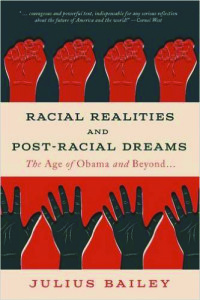Wittenberg’s Julius Bailey has once again released another book, titled “Racial Realities and Post-Racial Dreams: The Age of Obama and Beyond.”
 Released on Dec. 30, 2015, this book is somewhat of a love letter, explained Bailey. It is an introspective journal that shows the world how it feels to love something so much in spite of constantly being disappointed by the beloved.
Released on Dec. 30, 2015, this book is somewhat of a love letter, explained Bailey. It is an introspective journal that shows the world how it feels to love something so much in spite of constantly being disappointed by the beloved.
“These are intellectual and even ethical mirror-moments that force our nation to see what are the scars of love, the misgivings of complacency, the hunger pangs of neglect and a last ditch effort to throw out a life-line and keep our relationship together in joint pursuit for excellence,” Bailey said.
His main purpose to writing this book was to give voice to those “faces at the bottom of the veil,” as writer Derrick Bell once talked about. Bailey also explained that he had a series of conversations on Islamophobia and American Immigration Policies with a Wittenberg student, senior Jake Murray, that gave inspiration to this book.
“The proverbial straw that broke the camel’s back in my fatigue of state-sanctioned black murder [was] with the death of Eric Garner in New York being choked to death by Daniel Pantaleo in 2014. I wanted to vent about an America that I love but is constantly letting me down,” Bailey said.
He dedicated his book to All Servant-Leaders, and he puts an inscription to those incarcerated in Illinois and Ohio prisons and across the country in general.
“I did this because it is clear to me that as I go across the county to speak, the most emotional discussions are those with my brothers and sisters locked up,” Bailey said. “They represent an interesting juxtaposition between hope and nihilism which, I argue, bespeaks the very crux I find myself in as ‘I too, sing America.’”
He gives the influence to three of his colleagues, J. Rob Baker in political science, who helped him through his analysis of the Voting Right Act and its racial elements, and Fred Tiffany and David Wishart in economics, who both challenged him to be more empirical in his discussion and “ground yourself in the numbers,” which is heavily seen in chapters five and six in the book “Economics, Inequality, and Poverty.”
Bailey by far believes this is one of his best writings after his two major edited projects: “Jay-Z: Essays on Hip Hop’s Philosopher King” (2011) and “The Cultural Impact of Kanye West” (2014), and his two major solo projects “Philosophy and Hip Hop: Ruminations on Cultural Form” (2014) and now “Racial Realities and Post-Racial Dreams: The Age of Obama and Beyond” (2015).
He believes each book was successful in its own unique ways.
“It is prayerful, methodical and purpose [sic] for a broad/general audience. It pushed me emotionally and academically,” Bailey said.
To hear more about his book, listen to his national interview with Sirius XM P.O.T.U.S. on soundcloud.com.





